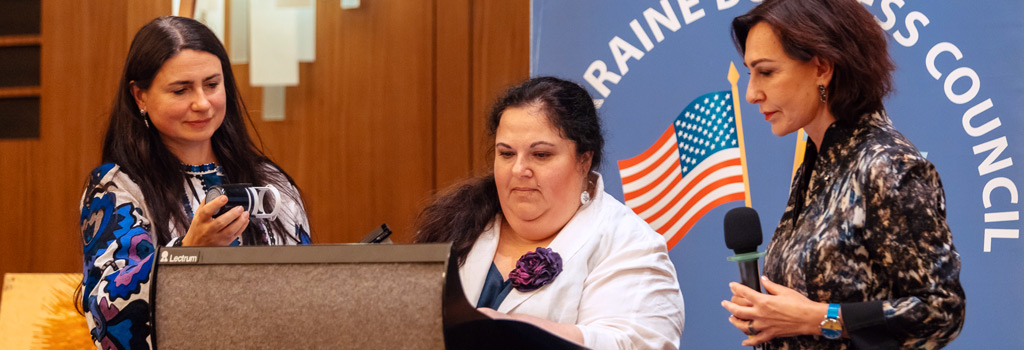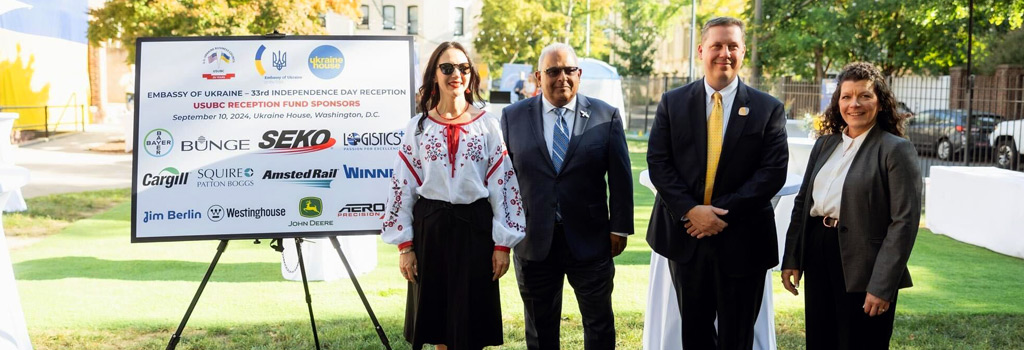Featured Galleries USUBC COLLECTION OF OVER 160 UKRAINE HISTORIC NEWS PHOTOGRAPHS 1918-1997
 Holodomor Posters
Holodomor Posters

OVERVIEW OF ADOPTED AND PENDING CHANGES UKRAINE'S PSA LEGISLATION
 By Irina Paliashvili and Olga Nevmerzhytska
By Irina Paliashvili and Olga Nevmerzhytska
RULG-Ukrainian Legal Group, P.A., Wash, D.C. & Kyiv, Ukraine
Published by U.S.-Ukraine Business Council (USUBC),
Washington, D.C., Monday, August 26, 2013
This overview describes the latest adopted and pending changes to the Ukrainian legislation applicable to production sharing agreements (“PSA”). For the ease of reference each section includes a brief Summary sub-section, a more detailed Background sub-section and the Impacts sub-section with our comments on the effect we envision these changes to have on the PSA projects.
1. Amendments to the PSA Law restoring the PSA Interagency Commission
Summary
The Law on "Amendments to the Law of Ukraine “On Production Sharing Agreements” concerning the State Regulation of the Conclusion and Performance of the Agreements” (the “PSA Commission Amendments Law”) took effect on 21 July 2013.
The main purpose of the PSA Commission Amendments Law is to reinstate the recently abolished PSA Interagency Commission (the “PSA Commission”).
There are some other significant amendments to the PSA Law based on the PSA Commission Amendments Law:
- a new provision is added in Article 5 (part two) explicitly allowing the PSA parties to delegate the management and coordination of their PSA to the Management Committee or another body created by the parties.
- amendments to Article 13 (part three) prevent the parties from making the English version of their PSA the prevailing one if there is a conflict between the Ukrainian and English versions. It is a mandatory rule of the PSA Law that the Ukrainian version of the PSA prevails in case of a conflict with the English version.
- amendments to Article 28 stipulate regular inspections of PSA implementation by the Cabinet of Ministers, which inspections must be carried out at least once in five years.
Background
The PSA Commission was stipulated from the start in the original version of the 1999 Law “On Production Sharing Agreements” (the “PSA Law”) and was the only institution, which coordinated the PSA issues among various Government bodies. PSA Commission was abolished as of December 2012 and replaced at various degrees with “the central body of executive power in the sphere of geological study and rational use of subsoil”, which at present is the State Service for Geology and Subsoil of Ukraine (“Derzhgeonadra”) and with the Ministry of Ecology and Natural Resources (“Ministry of Ecology”).
Abolishment of the PSA Commission created a vacuum because there was no other institution within the Cabinet of Ministers, apart from the Cabinet of Ministers itself, which would co-ordinate the PSA issues among various key Ministries, State Agencies, and bodies of Local Self-Government. It was highly unlikely that the Cabinet of Ministers itself would take over the coordination role, so in practice this role fell upon Derzhgeonadra, Ministry of Ecology and Ministry of Energy.
The PSA Commission Amendments Law gives the Cabinet of Ministers broad discretion to create the PSA Commission, establish procedures and rules for its operation and appoint its Working Body (in practice, the latter will do all the administrative and some substantive work).
Also, the PSA Commission Amendments Law allows the Cabinet of Ministers to delegate some of its responsibilities to an unnamed “central body of executive power”.
According to the PSA Commission Amendments Law, PSA Commission regulations are to be approved by the Cabinet of Ministers within 3 months after this Law takes effect, i.e. by 21 October 2013. At this time we have not found in open sources any drafts of the relevant regulations.
However, the Resolution No. 509 of the Cabinet of Ministers Ukraine dated 16 March 2000 that adopted the Regulations of the Interagency Commission in Charge of the Organization and Conclusion of Production-Sharing Agreements (the “Existing Regulations”) were not canceled when the original PSA Commission was abolished and remain in effect at present while the PSA Commission is being restored. In our opinion, the activities of the restored PSA Commission will be governed by the Existing Regulations until new regulations are adopted.
Please note that the Existing Regulations name Derzhgeonadra as the Working Body of the PSA Commission, which in practice should be the key authority during PSA negotiations.
As we understand, the restored PSA Commission has been already formed by the Cabinet of Ministers, although the relevant Resolution of the Cabinet of Ministers is not available in the open sources. The restored PSA Commission includes representatives of the Ministry of Energy and Coal Industry, the Ministry of Ecology and Natural Resources, the Ministry of Economic Development and Trade, the Ministry of Finance, the Ministry of Incomes and Charges, the Ministry of Justice, Derzhgeonadra, the State Service of Mining Supervision and Industrial Safety. The Minister of Energy and Coal Industry (at present Mr. Eduard Stavytsky) will direct the operation of the PSA Commission.
Impact
Reinstatement of the PSA Commission is a welcome development, which assures investors that there is indeed one institution within the Government formally responsible for all key PSA issues.
In practice, however, it is expected that most of the PSA issues will remain in the domain of the newly emerged triumvirate, formed within past few months under homogenous leadership: the Derzhgeonadra, Ministry of Ecology and Ministry of Energy (in the past, under the previous leadership, the Ministry of Ecology/Derzhgeonadra on the one hand, and the Ministry of Energy on the other hand, had not been known to co-ordinate their positions). It remains to be seen which Governmental body will ultimately be appointed the Working Body for the reinstated PSA Commission.
2. Clarifications of the National Bank of Ukraine regarding exempting PSA-based transactions from various burdensome currency regime and banking restrictions [1]
Summary
In its Letter No. 29-216/6760/7303 dated 20 June 2013 the National Bank of Ukraine (“NBU”) implements a number of previously adopted legislative amendments exempting PSA-based business transactions of investors (including foreign investors' representative offices in Ukraine) from various burdensome currency and banking restrictions.
Background
Ukraine has an archaic and very restrictive currency and banking regime, and the NBU, in line with previously adopted legislative amendments, exempts PSA-based business transactions from the restrictions imposed on:
- settlements in export and import transactions requiring that payments to residents of Ukraine must be made within 90 calendar days (stipulated by the Law “On Procedure for Making Foreign Currency Payments”, as well as the NBU Board Resolution No. 163 of dated 14 May 2013);
- residents receiving and repaying loans from non-residents, in particular the requirements stipulating mandatory registration by the NBU of the loan agreements with non-residents (stipulated by the Presidential Edict No. 734/99 dated 27 June 1999), as well as the restrictions concerning the interest rates under such loan agreements (stipulated by the NBU Resolution No. 363 dated 3 August 2004).
- the use of foreign currency in Ukraine in payments between resident-investors, which requires obtaining from NBU the individual license authorizing such payments (stipulated by the Cabinet of Ministers Decree No. 15-93 dated 19 February 1993);
- selected transfers of foreign currency to non-residents to pay for works, services or intellectual property rights under contracts, which are subject to a price examination to verify compliance with the market prices and to document actual provision of works, services or assignment of intellectual property rights (stipulated by the NBU Board Resolution No. 597 dated 30 December 2003);
- foreign currency proceeds received by residents, 50% of which are subject to mandatory conversion into local currency (UAH) at the interbank foreign exchange market of Ukraine (stipulated by the NBU Board Resolutions No. 163 and 164 dated 14.05.2013).
Impact
The purpose of this NBU Letter is to notify the Ukrainian banks, which under the law have responsibility to supervise foreign currency operations and monitor compliance with the applicable legislation, of the fact that various restrictions concerning such operations are not applicable to PSAs.
The NBU letter is an additional safeguard against potential obstacles for PSA-related banking and currency operations.
3. Bill on environmental safety concerning PSAs for unconventionals [2]
Summary
Bill No. 2318 on "Amendments to Some of the Legislative Acts of Ukraine Concerning Environmental Safety, Prevention and Elimination of the Negative Impact of Production of Unconventional Hydrocarbons on the Natural Environment in Connection with the Conclusion and During the Implementation of Production-Sharing Agreements" was registered in the Verkhovna Rada (Parliament of Ukraine) on 18 February 2013 (“Bill 2318”). Although the title of the Bill 2318 mentions unconventional hydrocarbons only, its substance allows to conclude that if adopted, it will affect all PSAs.
The Bill 2318 has been reviewed by the Verkhovna Rada Committee in Charge of Environmental Policy, Wildlife Management and Liquidation of Consequences of Chernobyl Disaster, and was recommended to be accepted as a basis for further consideration. It should also be mentioned that the Main Scientific and Expert Department of the Verkhovna Rada issued a negative opinion on the Bill 2318, stating that some of its provisions are conflicting and must be improved.
Background
The Bill 2318 stipulates inter alia the following changes:
- All PSAs become subject to approval by the Verkhovna Rada (at present the decision to enter into a PSA is made by the Cabinet of Ministers).
- Mandatory public hearings must be held when local self-government bodies approve PSA drafts.
- Mandatory environmental expert examination must be carried out by the investor during the performance of the PSA at least once a calendar year to identify environmental risks and safety of planned or performed activities and to assess the impact of the activities on the natural environment and quality of natural resources.
- Mandatory monitoring by public authorities of the natural environment in the PSA area must be carried out prior to the commencement of the works under the PSA, and annual monitoring of the PSA area must be carried out after the PSA takes effect. An essential change in natural environment will be a ground for canceling the PSA.
Impact
The Bill 2318, if adopted, will have a catastrophic effect on PSAs.
First, the approval of each PSA by the Verkhovna Rada would defeat an original purpose of the PSA Law to create an efficient and attractive regime for investment into the natural resources sector of Ukraine. Such approval in practice would not only cause significant and unreasonable complications and delays, but considering Verkhovna Rada’s highly politicized environment, most likely would result in failure to approve most of the PSA projects thus destroying all efforts by investors in preparing for and participating in the PSA tenders, negotiating PSAs with the Cabinet of Ministers, etc.
Second, although the Bill 2318 is aimed at a perfectly legitimate and important cause of environment protection, it contains a number of burdensome and unnecessary requirements resulting in extra financial and organizational efforts and costs for investors.
4. Bill on securing the interests of the local communities where PSA subsoil areas are located [3]
Summary
Bill No. 2936 on "Amendments to the Law of Ukraine "On Production-Sharing Agreements" aimed at securing the interests of the local communities where PSA subsoil areas are located, was registered in the Verkhovna Rada (Parliament of Ukraine) on 26 April 2013 (“Bill 2936”).
The Bill 2936 is currently being reviewed by the relevant Verkhovna Rada Committee.
Background
The Bill 2936 inter alia stipulates that:
- Social and economic cooperation agreements shall be concluded between the PSA investor and the local councils where PSA subsoil areas are located. Conclusion of such an agreement shall be a mandatory pre-condition for the conclusion of the PSA and shall be its integral part, stipulating the investor's obligation to insure the investor's liability for ecological harm for the benefit of local self-government.
- At least 10% of the State's share of production under a PSA must be used for the needs of the territories where PSA subsoil areas are located (currently PSA Law allocates no share of production for any local needs).
Impact
The purpose of the Bill 2936 is incorporating the interests of local communities into the PSA conclusions and implementation process. The absence of any provisions defending their interests in the current PSA legislation in practice has caused serious opposition to PSA projects from local communities and local authorities. So far the central Government has demonstrated no desire to share its future benefits from PSAs with the local communities where PSA projects will be implemented, shifting the burden of dealing with local authorities from itself to the investor.
Bill 2936 would split this burden between the PSA investor and the central Government, requiring that the investor enters into an agreement with the local authorities, while the central Government allocates at least 10% of the State’s share of production for local needs. Establishing incentives for local communities and clear procedures for granting these incentives, despite requiring additional time and efforts, ultimately is an inevitable positive measure needed for the efficient and fair PSA conclusion and implementation process.
5. Bill on amendments to PSA tax laws [4]
Summary
Bill No. 2288а on "Amendments to the Tax Code of Ukraine Concerning Some Tax Aspects of Production-Sharing Agreements" was registered in the Verkhovna Rada (Parliament of Ukraine) on 11 June 2013 (“Bill 2288а”).
The Bill 2288а stipulates that all investors in a multilateral PSA, and not just its operator as currently stipulated, can get registered as taxpayers and maintain tax accounts for the PSA. Also, both the operator and other investors in the multilateral PSA can show a tax credit with regards to VAT.
Impact
In our opinion, the PSA tax accounting options, proposed in the Bill 2288а represent a positive development. At the same time, while choosing a PSА tax option, it will be necessary for an investor, which is not the operator, to consider all aspects of the Ukrainian tax legislation, including complicated administration and extra accounting costs.
6. Bill on amendments to some legislative acts regarding subsoil use [5]
Summary
Bill No. 2438а on "Amendments to Selective Legislative Acts of Ukraine (Concerning Subsoil Use Approvals)" was registered in the Verkhovna Rada (Parliament of Ukraine) on 27 June 2013 (“Bill 2438а”).
The Bill re-assigns PSA approval responsibilities from local self-government authorities to Oblast [regional] State Administrations (local executive authorities).
Impact
According to its authors, Bill 2438а will clarify uncertainties in allocation of powers between local self-government and local executive authorities, and thus will prevent unreasonable delays and complications in obtaining approvals for PSAs from local authorities.
7. Draft of the new Subsoil Code [6]
Summary
The Ministry of Ecology has drafted a new Subsoil Code (“Subsoil Code Draft”), which is at present under public discussion. The Subsoil Code Draft has not yet been submitted to and registered with the Verkhovna Rada, and therefore it is not expected to be adopted in the near future. This is the latest of the numerous attempts to modify the existing Subsoil Code, none of which so far have had serious chances fore success.
Background
The Subsoil Code Draft stipulates inter alia:
- qualifying the rights to use subsoil as a matter of civil turnover (at present, the law prohibits subsoil users form carrying out a number of important civil-law operations with regards to their subsoil rights, in particular alienating, pledging or contributing such rights in joint activities or joint ventures);
- incorporation into Subsoil Code the provisions of selected other laws applicable to subsoil laws, which laws will be canceled, in particular:
* Law «On State Geology Service of Ukraine» dated 4 November 1999 ;
* Law of Ukraine «On Oil and Gas» dated 12 July 2001;
* Law of Ukraine «Coal Deposit Gas (Methane)» dated 21 May 2009;
- reducing the list of grounds for obtaining subsoil licenses in a non-competitive procedure (i.e. without an auction or a tender);
- streamlining and clarifying inspection procedures.
Impact
The purpose of the Subsoil Code Draft is to modernize and harmonize all subsoil legislation, modify the right to use subsoil, reduce the number of approvals and other bureaucratic procedures, etc. It remains to be seen, however, if this particular version of the Subsoil Code Draft will be introduced by the Cabinet of Monsters to the Verkhovna Rada for consideration.
8. Draft Cabinet of Ministers Resolution on investor's civil-law liability insurance [7]
Summary
The Cabinet of Ministers developed a draft Resolution on "Approval of a Procedure and Rules Concerning the Investor's Mandatory Civil-Law Liability Insurance, Including Harm to Environment and Human Health, Under Production-Sharing Agreements, Unless the Agreement Stipulates Otherwise" (the “Draft Resolution”).
The Draft Resolution was developed on the basis of the Law "On Insurance", the PSA Law and the Law "On Protecting Natural Environment" that stipulate the investor's civil-law liability insurance, including against harm to natural environment and human health, unless a specific PSA stipulates otherwise.
It is interesting to note that although the Draft Resolution uses the word “mandatory”, the insurance requirement will not be in fact mandatory, because under Article 30.2. of the PSA Law the PSA parties may agree otherwise in their PSA. In other words, the insurance requirement will become mandatory only if the PSA parties failed to agree otherwise in their PSA.
Impact
The purpose of this Draft Resolution is to set the procedure and rules concerning investors' PSA liability insurance. According to the drafters, it will be favorable both for the State and for investors.
The benefits for the State would include:
- reducing the burden on the State budget;
- guaranteed indemnification to individuals and legal entities;
- improving environment protection.
The benefits for investors would include:
- guaranteed indemnification of possible damage to property because of third parties' acts;
- potential money saving if an investor is found guilty in an insured event.
9. Drat Order of the Ministry of Ecology on the rules of developing oil and gas deposits [8]
Summary
The Ministry of Ecology has drafted an Order on "Approval of the Rules of Developing Oil and Gas Deposits" (the “Draft Order”). The purpose of this Draft Order is to replace the archaic procedure for developing oil/oil and gas deposits set forth in a 1984 USSR regulation [9] and to establish modern fundamental regulations concerning the organization and implementation of the development of deposits, as well as to regulate subsoil use relations for subsoil users.
Impact
According to the drafters, establishing modern and clear regulations for oil and gas industry will have a positive impact on natural environment and human health.
We believe, however, that introduction of such strict regulations can have both the positive and the negative effect. On the one hand, it will help to prevent disputes with various governmental authorities caused by the lack of clear legal regulations, but on the other hand the regulations can create additional bureaucratic obstacles, requiring significant additional resources from the subsoil users.
FOOTNOTES:
[1] http://www.visnuk.com.ua/ua/news/id/446
[2] http://w1.c1.rada.gov.ua/pls/zweb2/webproc2_5_1_J?ses=10008&num_s=1&num=2318&date1=&date2=&name_zp=&out_type=&id=
[3] http://w1.c1.rada.gov.ua/pls/zweb2/webproc4_1?pf3511=46802
[4] http://w1.c1.rada.gov.ua/pls/zweb2/webproc4_1?pf3511=47381
[5] http://w1.c1.rada.gov.ua/pls/zweb2/webproc4_1?pf3511=47654
[6] http://www.menr.gov.ua/content/article/11913
[7] http://www.menr.gov.ua/content/article/11893
[8] http://www.menr.gov.ua/content/article/48
[9] Rules for Developing Oil and Gas Deposits, approved by the USSR Oil Industry Ministry dated 15 October 1984 No. 44.
----------------------------------------------------------------------------------------------------------
NOTE: RULG-Ukrainian Legal Group is a full-service law firm based in Kiev and Washington, D.C. that provides comprehensive legal support to international corporate clients doing business in Ukraine and other CIS countries. One of the RULG’s key practice areas is upstream oil & gas, under both the Licensing Regime and the PSA Regime.
RULG co-authored the production sharing (PSA) legislation for Ukraine, and has been representing international oil companies in their investment projects in Ukraine for over 20 years. Detailed information about RULG practice is available at www.rulg.com. Dr. Paliashvili can be contacted at irinap@rulg.com
===================================================
U.S.-Ukraine Business Council (USUBC): http://www.usubc.org
Promoting U.S.-Ukraine business relations & investment since 1995.
===================================================

















